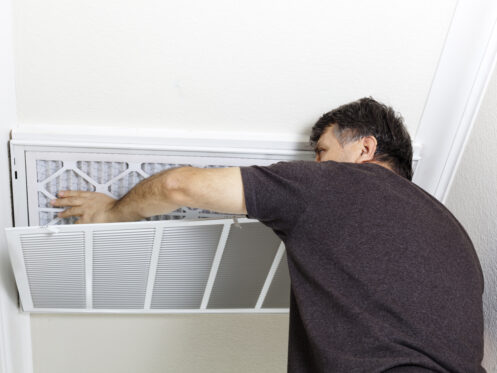Winter temperatures in Oklahoma City, OK, often dip below freezing. Keeping your heater running and your home sealed tight is essential for maintaining a comfortable environment. However, if you aren’t careful, your efforts to stay warm could diminish your indoor air quality (IAQ). During the cold season, the average IAQ significantly declines.
Tight Home Envelope Promotes Efficiency But Diminishes IAQ
Among the easiest ways to support the performance and efficiency of your HVAC system is by creating a tightly sealed home. This way, the conditioned air that your furnace and AC produce isn’t slipping outdoors by way of cracks and gaps in building materials. Adding weather stripping around your windows and doors, closing up air leaks with caulk, and adding new insulation will all tighten your home’s envelope.
In winter, most people keep their windows and doors sealed shut all of the time. When paired with tight envelopes, this prevents stale, stagnant air in a building’s interior from flowing outside. This also prevents fresh outdoor air from flowing in. According to the U.S. Environmental Protection Agency (EPA), the air inside homes is up to five times more contaminated than the outdoor air. Even as you’re minimizing your carbon footprint and keeping your energy bills at a modest, manageable level, you’re also compromising your IAQ.
Clean and Improve Your Mechanical Ventilation
The “V” in HVAC stands for ventilation. It’s the one aspect of HVAC systems that homeowners most commonly overlook. All homes have mechanical ventilation in their bathrooms and kitchens. You should use your range hood fan and bathroom exhaust fans to draw moist, contaminant-laden air out when cooking, bathing, or taking showers. You should also clean these fans regularly to ensure optimum performance. You can work with our team to find out if adding additional mechanical ventilation is essential for improving and supporting your home’s IAQ.
Have Your Home Envelope Professionally Assessed
Find out whether your home envelope is too tight by scheduling a professional energy assessment or an indoor air quality assessment. In homes with fuel-combusting appliances, airtight envelopes create the risk of back-drafting. When air is constantly drawn out but has no viable points of entry, negative air pressure pulls carbon monoxide and other exhaust gases back indoors through exhaust vents. A professional can tell you whether or not your latest envelope-tightening measures were too aggressive.
Having Dry Indoor Air Leads to Increased Airborne Particulates
Having too much moisture in your home will wreak havoc on your flooring, drywall, windows, and more. Excess moisture sets the stage for fungal growth and often creates funky, pervasive odors. However, overly dry indoor air is equally problematic. This is especially true when it comes to your indoor air quality.
Airborne moisture weighs dust, pollen, and other particulates down. This causes these allergens and contaminants to settle on indoor surfaces, where they’re eventually wiped off, vacuumed up, or swept into dustpans. Although keeping your heater on is essential for maintaining a safe and cozy living space, it leaves you with an excessively dry home. This can decrease your indoor air quality and cause a variety of health issues.
Consider Installing a Whole-House Humidifier
Whole-house humidifiers are popular, integrated HVAC accessories that improve indoor air quality. These systems add moisture to the air to maintain balanced humidity all year. This will alleviate dry-air symptoms like irritated nasal passages, dry and flaky skin, congestion, and nosebleeds. Although your HVAC system can extract excess humidity, it cannot add it on its own.
The Winter Rush for HVAC Air Filters
According to HVAC equipment manufacturers, homeowners should inspect their standard furnace filters monthly and change them every 30 to 90 days. Dirty HVAC air filters are the most common cause of heating system failure. Local home and hardware stores are often inundated by homeowners who’ve neglected this maintenance in the past once winter has arrived. If you wait for filter-related problems to arise before swapping this component out, you may find that filter aisles in local stores are already empty. Using your furnace with a dirty filter will undermine its performance and greatly degrade your indoor air quality.
Always Schedule a Heating System Tune-up Prior to Winter
Have your heating system inspected and tuned up before winter arrives. Annual maintenance primes heaters for the challenges of the cold season. In addition to replacing damaged and worn parts and dirty air filters, our technicians clean heaters both inside and out. We also inspect all failsafe measures and check for rips, perforations, and other structural damage in HVAC ducting.
Common Winter Activities Diminish IAQ
Winter is also a time for burning candles, lighting fires in the fireplace, discharging room freshening sprays, and using chemical-laden surface cleaners. To protect your IAQ this winter, choose products that won’t add large amounts of toxins to the air. Homemade cleaning solutions with ingredients like white vinegar and essential oils will have far less of an impact on your IAQ than most store-bought cleansers. For ambiance and odor control, choose natural, soy, or beeswax candles and fragrances derived from either essential oils or natural hydrosols.
Building Materials Will Diminish Your IAQ
Among the many factors that diminish IAQ, your home’s building materials are a major culprit. Flooring adhesives, paint, particle board, and solvents used throughout the building are constantly off-gassing volatile organic compounds (VOCs) like formaldehyde and benzene. To minimize these IAQ challenges, seal or get rid of unsealed particle board and increase your mechanical ventilation. On milder days, you can even turn your heater off and open your windows and doors for 30 to 60 minutes to circulate and freshen the indoor air.
Having Everyone at Home for the Winter Season Creates New IAQ Concerns
If you have a lot of people living in or visiting your home during the cold season, you may have too much indoor humidity. Although central HVAC systems offer limited humidity regulation, they aren’t meant to resolve serious moisture problems.
Large households have lots of people taking hot showers and baths, cooking, and adding moisture to the indoor air in other ways. Rather than feeling cozy and warm, your home could feel muggy and oppressive. Unfortunately, conditions like these are perfect for the development of mildew and mold. If excess humidity is left unchecked, residents may develop IAQ-related respiratory and general health issues.
Signs You Need a Whole-House Dehumidifier
If you have beads of condensation on your windows and walls, your indoor humidity is too high. If your indoor humidity is consistently high, you may even have warped baseboards and other misshapen building materials. Persistent and widespread mold is a common indication of humidity problems. Moreover, before you can effectively treat mold, you’ll need to get your indoor moisture levels under control first.
Whole-house dehumidifiers are integrated HVAC accessories. They’re attached directly to HVAC ductwork, and they seamlessly support the humidity regulation of furnaces and air conditioners.
Indoor Pets and Shedding
In winter, your pets lounge or frolic indoors much more than they normally do. In the summer, they spend more time outdoors, minimizing the accumulation of dander indoors. Routinely brushing cats and dogs collects the hair and dander that would otherwise circulate throughout the building. When the weather permits, you can do this outside or in your attached garage. You can also pamper your canine or feline companions with regular trips to the groomer.
Since 2015, True Climate Heat + Air has been providing exceptional heating, cooling, and indoor air quality services throughout Oklahoma City, OK, and the surrounding area. We also provide plumbing services, ductless mini-split systems, and preventative maintenance plans. For help protecting or improving your IAQ this winter, give True Climate Heat + Air a call today.


